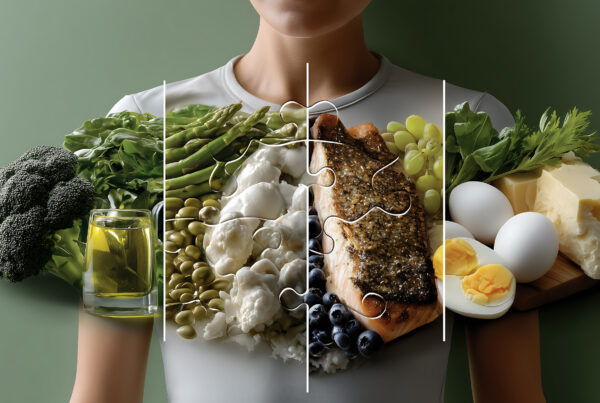”The community recently asked: During the holiday season, are there ways to eat that will support better health and make me happy!?
Reading time: 10 Minutes
MWi Hacks:
- Find out what foods can make you happy this holiday season
- Learn how food is not just impacting your mood, it can also reduce your chance of diseases
MWi Summary:
- Multiple studies have shown greater fruit and vegetable consumption was positively associated with reduced depression, less psychological distress, fewer mood and anxiety problems, and perceived mental health.
- High consumption of animal products can lead to inflammation which is connected to increased feelings of anxiety, stress, hopelessness, and depression.
- Fruits and vegetables decrease inflammation because of their antioxidant content, which greatly reduce inflammation.
Good Mood Foods: How Diet Affects Happiness
If you are presently piling plenty of colorful plants on your plate, you are already at a better mood advantage. Research tells us that plant-based diets are associated with healthier mood states. The more fruits and vegetables people eat, the happier, less depressed, and more satisfied they are with their lives. Today, we’ll focus on how, grounded in your biochemistry, eating more plants and eliminating animals and their products from your diet creates greater mental well-being and resilience.
Plantified Plate = Mood Elevator Up
A recent study of nearly 1,000 men and women examined the mood impact of obtaining dietary antioxidants. Antioxidants are health- and disease-protective bioactive chemical compounds produced by plants. In the study, those who ate three or more servings of fruits and vegetables a day reported significantly greater optimism than those who ate less. Eating lots of veggies also bumps up the B vitamins in your diet, positively affecting mood states.
Another recent, large-population, multi-wave study — taking place five times over the course of nine years — focused on the impact of fruit and vegetable intake on depression, anxiety, and mental health disorders.
Results were consistent across all five waves: greater fruit and vegetable consumption was positively associated with reduced depression, less psychological distress, fewer mood and anxiety problems, and improved perceived mental health.
Study after study corroborates. A large Swiss survey reported significant associations between higher fruit and vegetable consumption and reduced distress levels. People who ate less than the five-servings-a-day recommendation had a higher likelihood of reporting stress and anxiety than those who didn’t. A recent study on women’s health from Australia followed over 6,000 women. The findings? Reduced depression among women who simply ate more than two pieces of fruit a day. And the benefit increased when accompanied by higher intakes of vegetables.
Can Cutting Meat Improve Your Mood?
We get it — eating more plants boosts your mood. What if we look at it another way — cutting out the meat? How might that affect your state of mind? As it turns out, emotional resiliency and elevated mood states arise for more reasons than simply because you know you are doing the right thing. There’s a deeper biochemical component that underpins well-being that comes with veganizing your plate.
According to research, reduced intake of animals and their products has mood benefits in addition to those that come with a robust daily intake of fruits and vegetables. Avoiding meat, fish, and poultry leads to more frequent reports of positive states of mind. And vegans report lower anxiety and less stress than omnivores.
Inflammation and Increased Risk of Depression
Putting it all together, the Western diet — characterized by scanty consumption of plant foods, yet heavy on the animal products — is associated with increased risk of depression. Depression is related to inflammation in the body. Arachidonic acid, found only in animal products, is a precursor to inflammation. Research shows that high intakes of arachidonic acid promote changes in the brain that can disturb mood.
Here’s how it works. By eating chicken, eggs, and other animal products high in arachidonic acid, a series of chemical reactions is triggered in your body that results in inflammation. When inflammation reaches the brain, feelings of anxiety, stress, hopelessness, and depression follow. No wonder people who avoid animal flesh and products report a happier, more positive mood. And plant foods — to the rescue, once again — naturally lower inflammation due to their naturally high antioxidant content, antioxidants being one of nature’s most powerful anti-inflammatory agents.
Nutrients provide the biological building blocks for neurotransmitters — the chemicals in your brain that deeply affect how you think and feel. When you aren’t eating enough vitamins, minerals, antioxidants, polyphenols, and related nutrients found in plants — known in this context as neuronutrients — you can’t make adequate mood-enhancing transmitters. These gems of plant nutrition, by the way, are the same goodies proved to be brain protective against Alzheimer’s disease and other forms of dementia.
Diets rich in the kind of saturated fats that are abundant in animal products — and deficient in antioxidants and vitamins — appear to promote the onset of the disease, whereas diets rich in plant-plentiful vitamins, antioxidants, and polyphenols suppress its onset. All the colors plants bring to your plate are evidence of the nutrients your brain needs for better disposition. No wonder just seeing your luncheon salad makes your mood brighten.
MWi would like to thank Lani Muelrath for writing this article and supporting our community with her expert insights. Follow this link to read the original article:
nytimes.com/2019/06/10/health/nutrition-diet-genetics-food.html
Lani Muelrath
Lani Muelrath, MA, is an award-winning health educator, professor, best-selling author, inspirational speaker, and TV host widely sought for her expertise in mindful, active, plant-sourced nutrition, vegan living.
Lani has been featured on CBS-TV, ABC-TV, Prevention magazine, USA Today, Huffington Post, The Saturday Evening Post, and NSPR. She created and starred in her own CBS television show, Lani’s All Heart Aerobics, and has served as presenter and consultant for the Physician’s Committee for Responsible Medicine, The Complete Health Improvement Project, and Plant Pure Nation.
Recognized as a thought leader and pioneer in the integration of vegan living, fitness, and mindfulness, Lani’s approach blends plant-based nutrition with compassion, mind/body awareness, movement, and transformational techniques from mindfulness meditation practice. She has been teaching in health, fitness, and wellness for over four decades.






